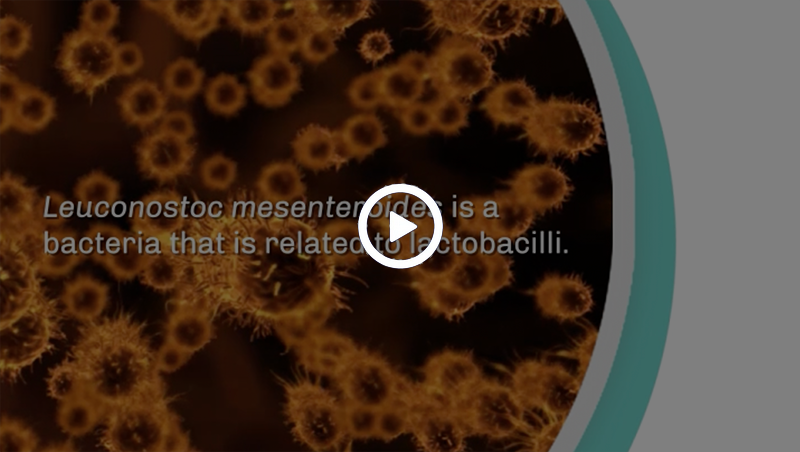Lactic Acid Bacteria (LAB) is the name used to refer to bacteria that are usually found in decomposing plants and milk products, producing lactic acid as the major metabolic end product. LAB strains have been extensively investigated because of their high safety profile. Leuconostoc mesenteroids is a LAB strain related to lactobacilli that is used in adding flavors to milk and cheese during fermentation and provide antioxidant and anticancer effects by making compounds such as diacetyl and other active metabolites.
Lactic Acid Bacteria and Their Metabolites
One of the active metabolites produced by LAB during their growth and metabolism are exopolysaccharides (EPS). Once secreted, EPS either attaches to the cell wall of the bacteria or dissolves in the fermentation medium. Nevertheless, large-scale production of EPS is currently being explored due to its several health and industrial benefits. For example, EPS with high thermal stability and solubility can be used as an emulsifier or a thickening agent in food and cosmetics. Pharmacological activities such as antioxidant, antiviral, anti-inflammatory, immune system regulation, and anticancer potential have also been reported.
Health Benefits of L. mesenteroids
Free radicals are unstable atoms that are naturally produced inside the body. High amounts of free radicals could lead to oxidative stress that could damage the body’s cells, leading to a range of diseases including cancer and aging. Reducing the levels of free radicals requires antioxidants that help make these atoms become stable.
In several studies, it was found that EPS from L. mesenteroids isolated from sourdough, Daijang (soybean paste) and kimchi have antioxidant activity and are able to scavenge free radicals in a concentration-dependent manner.
EPS also stimulates the immune system. When a foreign substance or a pathogen goes inside the body, the immune system reacts by regulating the production pro- and anti-inflammatory cytokines that signal the immune system to do its job of protecting the host. This same effect is true with cancer cells since these cells are not native to the human body. Several studies have shown that EPS derived from different strains of L.mesenteroids is able to induce the production of anti-inflammatory cytokines and inhibit the production of pro-inflammatory cytokines. It also inhibits the growth of different types of cancer in vitro by promoting a process called apoptosis (cell death). Different types of cancer cells have been studied including liver, colon, and cervical cancer. Overall, these findings indicated the likelihood of the probiotic as an alternative or complementary treatment modality in signaling–targeted cancer therapy.
Conclusion
LAB has found broad applications in both health and industry coming from traditionally fermented foods and beverages to rationally controlled food fermentation, in situ production of industrially relevant metabolites, and use as probiotics or as efficient microbial cell factories. In particular, L. mesenteroides is a LAB strain that is reported to have several health benefits due to the production of active metabolites such as EPS. Like other probiotics, studies have shown that it helps in intestinal health and defense against viruses including Covid-19, and reduce the risk of respiratory infection by producing various antiviral and anti-inflammatory compounds. Lastly, different probiotic strains and/or their conditioned medium have been found useful for targeted therapy of cancer.
References:
- https://pubmed.ncbi.nlm.nih.gov/31201910/
- https://www.dovepress.com/a-review-on-the-antiviral-activity-of-functional-foods-against-covid-1-peer-reviewed-fulltext-article-IJGM
- https://www.sciencedirect.com/science/article/abs/pii/S0753332217323065
- https://www.sciencedirect.com/topics/agricultural-and-biological-sciences/leuconostoc-mesenteroides
- https://www.medicalnewstoday.com/articles/318652#What-are-free-radicals
- https://www.cancer.org/treatment/treatments-and-side-effects/treatment-types/immunotherapy/cytokines.html
- https://www.sciencedirect.com/science/article/abs/pii/S1756464619300039
- https://www.readcube.com/articles/10.3389/fmicb.2021.644226



